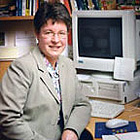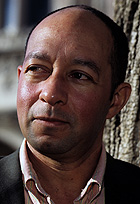Burnell to speak on scientific discovery
Radio astronomer and astrophysicist Jocelyn Bell Burnell, Ph.D., the first to discover pulsars, will describe her landmark work and current research 11 a.m. March 19 in Graham Chapel as part of the Assembly Series. Her talk, “In Pursuit of Pulsars,” is the annual Compton Science Lecture.
Radio astronomy research had been occurring since the 1950s but was limited until Cambridge astronomers developed a suitable type of radio telescope. Under the supervision of her doctoral adviser, Antony Hewish, Ph.D., Burnell was involved in the construction of the telescope and was responsible for the monitoring and interpreting of the transmission recordings.

In 1967, her observation of unusual radio signals led to the detection of the first known pulsar, considered the most remarkable astronomical discovery in recent history. The pulsars appeared as an appendix in her doctoral thesis. In 1968, she co-authored two papers on pulsars in the science journal Nature.
In 1974, Hewish and Cambridge colleague Martin Ryle received the Nobel Prize in physics — in part for the discovery of pulsars. It was the first time the prize was given for work in astronomy.
Burnell was born in Belfast, Northern Ireland. She earned a bachelor’s degree in physics from the University of Glasgow in 1965, followed by a doctorate in radio astronomy from the University of Cambridge in 1969.
She is an enthusiastic communicator of science and a role model for women in science. She has taught and conducted research at the University of Southampton, University College London and at the Royal Observatory in Edinburgh.
She was dean of science at the University of Bath and taught physics at the Open University (England). She also spent a year as a distinguished visiting professor at Princeton University.
She holds a visiting professorship in astrophysics at the University of Oxford and is a fellow at Mansfield College, Oxford.
She has received many honors and awards for her contributions to science, including the Michelson Award, the Oppenheimer Memorial Prize, the Tinsley Prize from the American Astronomical Society, the Herschel Medal of the Royal Astronomical Society and the Priestley Award.
The ethical dimensions of science remain important to her. Since her school days, she has remained active in the Religious Society of Friends (Quakers) and maintains a strong commitment to the education of women and the need to encourage dialogue between practicing scientists and the public.
The event is free and open to the public.
For more information, call 935-4620 or visit assemblyseries.wustl.edu.
Phillips and the ‘Art of Restlessness’
Each year the Interdisciplinary Project in the Humanities (IPH) in Arts & Sciences presents a lecture series to explore a facet of the intellectual terrain that makes us human. This year, the IPH will feature one of the best poets mining that landscape, Carl Phillips. He will deliver the first of three talks 4 p.m. March 25 in Umrath Lounge for the Assembly Series.
Phillips’ theme for his three-series talk is “The Art of Restlessness: On Poetry and Making.” The March 25 program will focus on “Poetry and Resistance.”

Phillips is a professor of English and of African and African American studies and a member of the Writing Program faculty, all in Arts & Sciences. He uses poems as vehicles to create thoughts for his readers. A common thread running throughout his work is the struggle to understand emotions that make us flawed, but wholly human, such as loss, love, desire and regret.
“If I want people to carry away any single thought or message from my poetry, it’s that it’s not only OK to be flawed and struggling — it just is a fact of life on Earth,” Phillips said in a 2006 profile for Washington University Magazine. “I try to present poems as opportunities to discover something about self and the world, not as complicated puzzles … to solve.”
The author of nine books of poetry and recipient of many top literary awards, Phillips has been nominated twice for the National Book Award, first for “From the Devotions” in 1998 and again in 2004 for “The Rest of Love.” In 2006, he won the Academy of American Poets Fellowship. His more recent collections are titled “Riding Westward,” and “Quiver of Arrows: Selected Poems 1986-2006.” In addition to poetry, Phillips also has written essays and has translated Sophocles.
He joined the faculty in 1993 and has guest-taught at Harvard University and the Iowa Writers Workshop. In addition to a bachelor’s degree in classics from Harvard University, he holds two master’s degrees, one in Latin and classical humanities from the University of Massachusetts and another in creative writing from Boston University.
He will present the second and third IPH lectures at noon March 27 in McMillan Cafe and at noon April 1 in the Women’s Building Formal Lounge.
All lectures are free and open to the public. For more information, visit assemblyseries.wustl.edu or call 935-4620.
For more information on the Interdisciplinary Project in the Humanities, contact 935-4200.